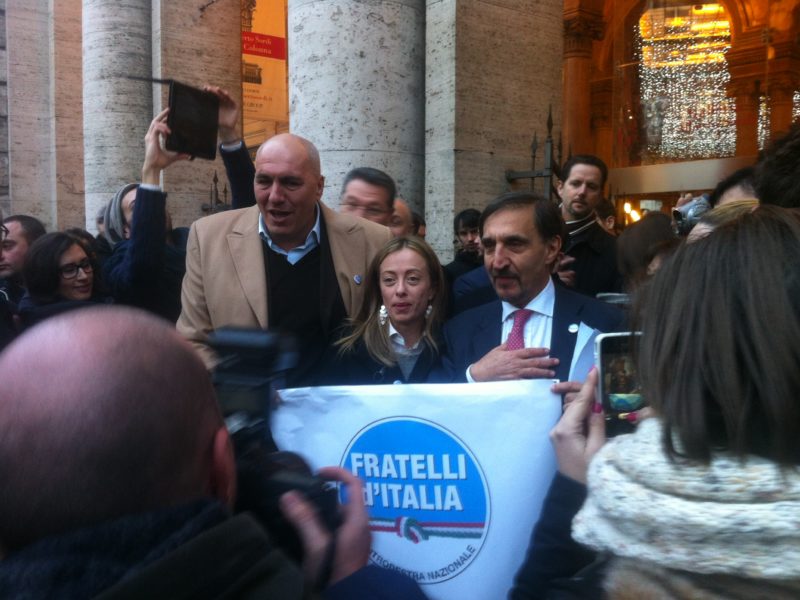Guest post by Erika Ricci
On September 25, Italy witnessed the victory of Giorgia Meloni’s Fratelli d’Italia party, the first far-right-led government in Italy since World War II. Although Meloni openly denounces fascist ideology, her slogan “God, family, fatherland” dangerously evokes the conservative policies, traditional social values, and rapprochement with the Catholic Church promoted by Italian fascists before the regime took power.
With the far right’s return to power, should we also expect the resurgence of political violence in Italy, much like what is happing across Europe and the US? My research suggests that the rise of far-right parties can spark both rightist and leftist violence and that a violent backlash may indeed happen in Italy, just like it did in the past.
Far-right parties are ascending globally. In the US, former President Trump gave voice to latent white supremacy and conservative policies, which continue to resonate with a radicalized Republican Party at the local, state, and federal levels. The January 6 insurrection exemplifies how the rise of far-right parties can lead to violence and undermine democracy. The same is true across Europe, where the rise of far-right parties has led to an increase in extreme right-wing political violence. Take the case of Hungary, where right-wing extremists are implementing a project of right-wing political change in the country. Far-right parties are gaining ground even in the most democratic European countries. In Sweden for instance, grievances about migration and identity have slowly moved the country toward right-wing populism.
Italy is quite familiar with extremist ideologies and the use of political violence to promote them. In the 1920s Mussolini built a totalitarian machine that suppressed rival parties, controlled the press, and surrounded the regime with fascist supporters. Italy became a dictatorship led by terror. In response, Italian citizens mobilized an effective resistance to fight the Nazi-fascism.
By the end of the 1960s, in the face of the economic crisis, miserable living conditions, radical inequalities, exploitation, and repression against the working class, the population had developed strong anti-fascist and anti-authoritarianism sentiment, questioned the legitimacy of the political institutions, and fought to gain important civil rights for workers, students, minorities, and women. Protesters were repressed by police forces and subject to the violence of far-right movements, allegiantly supported by the State. In response to political unrest and violent far-right groups, a far-left militant organization known as the Red Brigades emerged. My interviews with former Red Brigades members and other leftist armed groups active in the 1970s show that strong anti-fascist sentiment and the desire for equality and fairness within society drove their decision to embrace political violence. According to their testimonies, they felt they had no choice but to escalate violence to defend themselves from right extremism. State repression and violence from far-right groups were so harsh against civilians that the use of violence became the only means to rebalance power relationships. Moreover, they believed they had no political representation and that it was therefore impossible to reach revolutionary goals through legal paths.
Given the return of far-right movements and growing societal inequality—widening gaps between the rich and the poor, rising gender inequality, and racial discrimination—should we expect a resurgence of political violence in Italy? Meloni’s far-right party openly and proudly opposes LGBTQ rights and says it will reduce access to welfare benefits for foreigners and close Italian ports to prevent African immigrants departing from Libya from entering. If her party makes good on these goals, ethnic, sexual, and religious minorities will suffer, which could create a backlash. As research shows here and here, exclusion from power and the loss of pre-existing rights is one of the most powerful factors leading individuals to political violence.
However, pursuing such controversial policies might be more complicated than commonly assumed. Meloni’s victory lies in a coalition with the Lega Nord party led by Matteo Salvini and Forza Italia of ex-Premier Silvio Berlusconi. Although Fratelli d’Italia is now the first party with 26 percent of the votes, Meloni and her political projects still need to find common ground with their center-right allies whose support was necessary to win the elections. If the rest of the coalition and the opposition do their jobs, it should be challenging for the new Prime Minister to implement anything similar to extreme right and nationalist policies.
Moreover, Italy is known for unstable governments and coalitions that fail to maintain themselves. Since 1945, the country has seen the rise and fall of 69 governments, which means that each government lasted about 13 months on average. Thus, there is no evidence suggesting that Meloni’s power will be durable.
The recent past shows that far-right extremism and regressive governments can spark violence across the political spectrum. This past should be a warning for people in North America and Europe, given the advance of far-right parties. Therefore, policymakers should focus on combating extremist discourses, actively preserving democracy, and protecting representative institutions to avoid the rollback of civil rights and prevent political violence.
Erika Ricci is a PhD Candidate in Security Studies & Graduate Teaching Assistant in the School of Politics, Security, and International Affairs, University of Central Florida.






